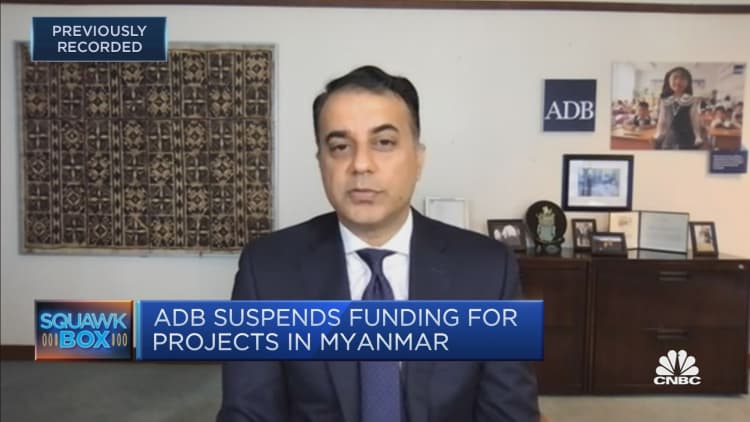Myanmar faced growing isolation on Thursday with increasingly limited internet services and its
last private newspaper ceasing publication as the military built its case against ousted elected leader Aung San Suu Kyi.
Nobel peace laureate Suu Kyi was overthrown and detained in a Feb. 1 military coup, triggering mass protests across the country that security forces have struggled to suppress with increasingly violent tactics.
The total documented number of people killed in the unrest stood at 217 but the actual toll was probably much higher, the Assistance Association for Political Prisoners activist group said.
Western countries have condemned the coup and called for an end to the violence and for the release of Suu Kyi and others. Asian neighbours have offered to help find a solution to the crisis.
Large parts of an economy already reeling from the novel coronavirus have been paralysed by the protests and a parallel civil disobedience campaign of strikes against military rule, while many foreign investors are reassessing plans.
The U.N. food agency warned this week that rising prices of food and fuel across the country could undermine the ability of poor families to feed themselves.
"Whatever happens in Myanmar over coming months, the economy will collapse, leaving tens of millions in dire straits and needing urgent protection," historian and author Thant Myint-U said on Twitter.

While the security forces have focused on stamping out dissent in Yangon and other cities, small demonstrations have erupted elsewhere day after day.
Several thousand people marched in the small town of Natmauk on Thursday, the Democratic Voice of Burma reported. The central town is the birthplace of Aung San, the leader of Myanmar's drive for independence from colonial power Britain, and Suu Kyi's father.
There were no reports of violence.
A 24-year-old campaigner against military rule died on Wednesday, three days after he was detained and beaten in the central town of Monywa, the Irrawaddy and Myanmar Now news portals reported.
The U.N. human rights office in Geneva said this week "deeply distressing" reports of torture in custody had emerged in Myanmar.
A junta spokesman did not answer telephone calls seeking comment.
Alleged payments
Authorities have restricted the internet services that protesters have been using to organise, with access to WiFi in public areas largely shut off by Thursday. Residents of some towns, including Dawei in the south, reported no internet at all.
The private Tachilek News Agency in the northeast published photographs of workers cutting cables it said were the fibre links with neighbouring Thailand.
Reuters could not verify the report. Information within the country is becoming increasingly difficult to verify.
Some 37 journalists have been arrested, including 19 who remained in detention, the U.N. human rights office said.
While authorities have ordered some newspapers to shut, others have apparently been forced to close for logistical reasons. The last private newspaper stopped publishing on Wednesday.
State-run media has not been effected. State television reported on Wednesday evening that Suu Kyi
was being investigated for bribery in connection with accepting four payments worth $550,000 from a prominent businessman.
Property developer Maung Weik, in comments broadcast in a state television news bulletin, said he had given Suu Kyi four payments, ranging from $50,000 to $250,000 from 2018 to 2020, when she headed the first civilian-led government in decades.
"According to the testimony of U Maung Weik ... Aung San Suu Kyi is guilty of bribery and the anti-corruption commission is investigating to take action under anti-corruption laws," state television said.
A spokesman for the junta said last week authorities were investigating Suu Kyi for receiving illegal payments.
Her lawyer dismissed that accusation as a joke. He was not immediately available for comment on Thursday.
Suu Kyi, 75, is hugely popular for her campaign against military rule since 1988, for which she has spent years in detention. The army defended its coup, saying its accusations of fraud in a Nov. 8 election swept by Suu Kyi's party were rejected by the electoral commission.
It has promised a new election but not set a date. Suu Kyi already faces various charges including illegally
importing walkie-talkie radios and infringing coronavirus protocols.
If convicted, she could be barred from politics.

